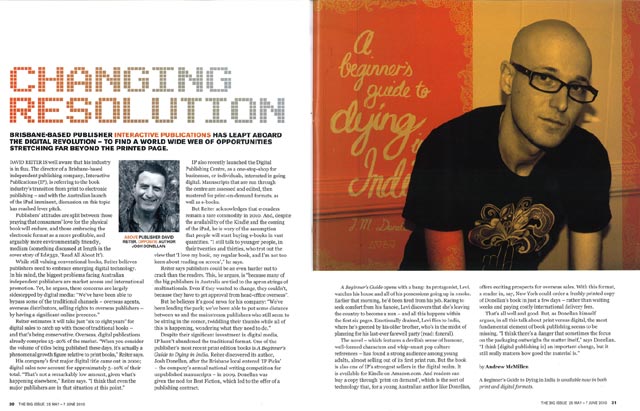The Big Issue story: ‘Changing Resolution’, May 2010
A story for The Big Issue #355 about Brisbane-based publisher Interactive Publications and one of its young authors, Josh Donellan.
Click the below image for a closer look, or read the article text underneath.
Changing Resolution
Brisbane-based publisher Interactive Publications has leapt aboard the digital revolution – to find a world wide web of opportunities stretching far beyond the printed page.
David Reiter is well aware that his industry is in flux. The director of a Brisbane-based independent publishing company, Interactive Publications (IP), is referring to the book industry’s transition from print to electronic publishing – and with the Australian launch of the iPad imminent, discussion on this topic has reached fever pitch.
Publishers’ attitudes are split between those praying that consumers’ love for the physical book will endure, and those embracing the electronic format as a more profitable, and arguably more environmentally friendly, medium. (Something covered at length in the cover story of our Ed#352, ‘Read All About It’.)
While still valuing conventional books, Reiter [pictured right] believes publishers need to embrace emerging digital technology. In his mind, the biggest problems facing Australian independent publishers are market access and international promotion. Yet, he argues, these concerns are largely side-stepped through digital media. “We’ve have been able to bypass some of the traditional channels – overseas agents, overseas distributors, selling rights to overseas publishers – by having a significant online presence.”
Reiter estimates it will take just “six to eight years” for digital sales to catch up with those of traditional books – and that’s being conservative. Overseas, digital publications already comprise 15–20% of the market. “When you consider the volume of titles being published these days, it’s actually a phenomenal growth figure relative to print books,” Reiter says.
His company’s first major digital title came out in 2000; digital sales now account for approximately 5–10% of their total. “That’s not a remarkably low amount, given what’s happening elsewhere,” Reiter says. “I think that even the major publishers are in that situation at this point.”
IP also recently launched the Digital Publishing Centre, as a one-stop-shop for businesses, or individuals, interested in going digital. Manuscripts that are run through the centre are assessed and edited, then mastered for print-on-demand formats, as well as e-books.
But Reiter acknowledges that e-readers remain a rare commodity in 2010 – and, despite the availability of the Kindle and the coming of the iPad, he is wary of the assumption that people will start buying e-books in vast quantities. “I still talk to younger people, in their twenties and thirties, who trot out the view that ‘I love my book, my regular book and I’m not too keen about reading on screen’.”
And, Reiter says, publishers could be an even harder nut to crack than the readers. This, he argues, is “because many of the big publishers in Australia are tied to the apron strings of multinationals. Even if they wanted to change, they couldn’t, because they have to get approval from head-office overseas.”
But, he continues, “It’s good news for us because we’ve been leading the pack; we’ve been able to put some distance between us and the mainstream publishers who still seem to be sitting in the corner, twiddling their thumbs while all of this is happening, wondering what they need to do.”
Despite their significant investment in digital media, IP haven’t abandoned the traditional format. One of the publisher’s most recent print edition books is A Beginner’s Guide to Dying in India. Reiter discovered its author, Josh Donellan [pictured left], after the Brisbane local entered IP Picks – the company’s annual national writing competition for unpublished manuscripts – in 2009. Donellan was given the nod for Best Fiction, which led to the offer of a publishing contract.
A Beginner’s Guide opens with a bang: its protagonist, Levi, watches his house and all of his possessions going up in smoke. Earlier that morning, he’d been fired from his job. Racing to seek comfort from his fiancée, Levi discovers that she’s leaving the country to become a nun – and all this happens within the first six pages. Emotionally drained, Levi flies to India, where he’s greeted by his older brother, who’s in the midst of planning for his last-ever farewell party (read: funeral).
The novel – which features a devilish sense of humour, well-formed characters and whip-smart pop culture references – has found a strong audience among young adults, almost selling out of its first print run. But the book is also one of IP’s strongest sellers in the digital realm. It is available for Kindle on Amazon.com. And readers can buy a copy through ‘print on demand’ – which is the sort of technology that, for a young Australian author like D0nellan, offers exciting prospects for overseas sales. With this format a reader in, say, New York could order a freshly printed copy of Donellan’s book in just a few days – rather than waiting weeks and paying costly international delivery fees.
That’s all well and good. But, as Donellan himself argues, in all this talk about print versus digital, the most fundamental element of book publishing seems to be missing. “I think there’s a danger that sometimes the focus on the packaging outweighs the matter itself,” says Donellan. “I think [digital publishing is] an important change, but it still really matters how good the material is.”
by Andrew McMillen
A Beginner’s Guide To Dying In India is available now – in print and digital formats.
Learn more about Interactive Publications at ipoz.biz, and click here to visit the homepage for Josh Donellan’s book, A Beginner’s Guide To Dying In India. I don’t read much fiction, but I enjoyed the hell out of this story and would recommend it to anyone.

 As chief trip-hop genre-definers, Massive Attack exist in 2010 as production duo Robert del Naja [stage name: 3D] and Grant Marshall [Daddy G], who work alongside co-producers, session musicians, and guest vocalists to skilfully mesh elements of electronica, hip-hop, drum-and-bass and house. Following the February release of their highly anticipated – and frequently postponed – fifth album,
As chief trip-hop genre-definers, Massive Attack exist in 2010 as production duo Robert del Naja [stage name: 3D] and Grant Marshall [Daddy G], who work alongside co-producers, session musicians, and guest vocalists to skilfully mesh elements of electronica, hip-hop, drum-and-bass and house. Following the February release of their highly anticipated – and frequently postponed – fifth album,